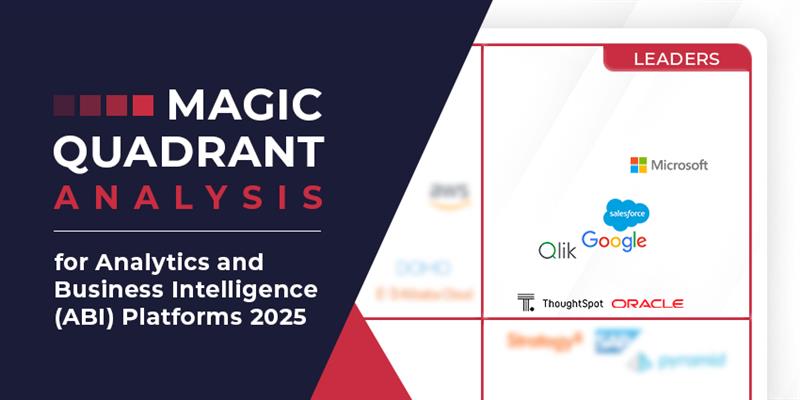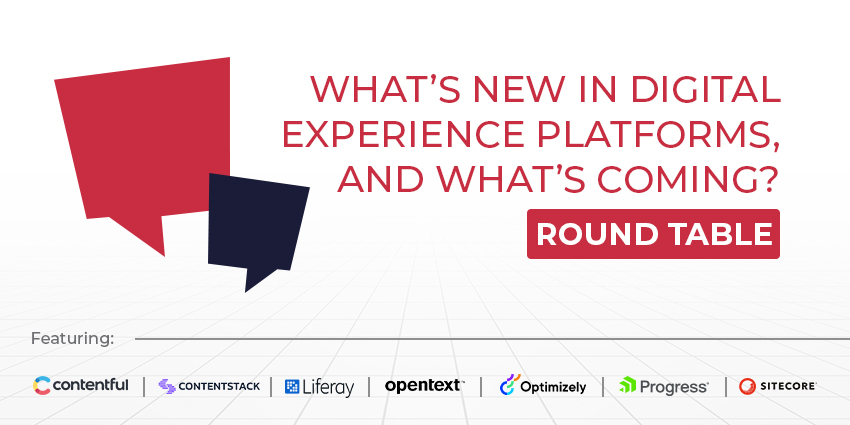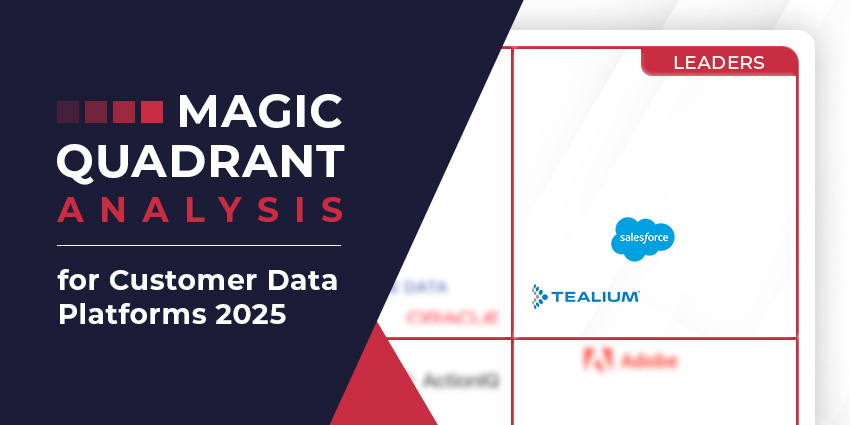Data challenges torment customer-facing teams. Now, with AI surging, overcoming these has never seemed quite so urgent.
To do so, businesses are leveraging customer data platforms (CDPs), centralizing data collection, and consolidating individual customer profiles.
From there, they’re activating all of that data in exciting, differentiative ways.
Six of the most prominent CDP providers are Amperity, BlueConic, SAP, Tealium, Treasure Data, and Zeta Global.
These providers put forward the following participants for this month’s roundtable:
- Matthew Biboud-Lubeck, General Manager EMEA at Amperity
- Leo Carbonara, VP of Product at BlueConic
- Shardul Vikram, CTO and Head of Data & AI at SAP I&CX
- Natalie Passarelli, Corporate Communications Manager at Tealium
- Karen Wood, VP of Product Marketing at Treasure Data
- Neej Gore, Chief Data Officer at Zeta Global
Below, these industry experts discuss the latest CDP features, key industry trends, and more.
Customer Data Platforms: The Latest Features
AI-Powered Identity Resolution
Biboud-Lubeck: When brands have numerous consumer touch points, both online and offline, it can be difficult to keep customer profiles up-to-date and accurate. There’s also the potential to mix up identities.
Indeed, studies have shown that almost a quarter of customer profiles held on record by brands are partial duplications of other profiles.
With AI-powered identity resolution, however, brands have a feature that can spot connections between customer profiles and combine them to create a more accurate view of each individual.
As such, brands can better identify who their high-value customers are, deliver highly personalized experiences, and roll this out at scale.
This new level of accuracy is dramatically increasing the success of brands’ marketing campaigns and loyalty programs, helping to boost sales, customer retention, and brand referrals.
Real-Time AI-Powered Decisioning & Activation
Carbonara: AI-powered decisioning and activation enable the CDP to evaluate individual customer behavior in real-time, apply machine learning models to predict the next best action or offer, and immediately activate that insight across any channel.
This feature stands out because it transforms a CDP into an intelligent orchestration engine. It ensures brands can respond to customers at the moment of interaction, whether that’s tailoring a website experience, triggering a personalized email, or optimizing a paid media bid.
With real-time decisioning, brands can also meet rising customer expectations for immediacy, relevance, and personalization.
Finally, the feature capitalizes on recent advances in cloud infrastructure and generative AI (GenAI), making it both scalable and accessible to enterprises aiming to deliver hyper-personalized experiences at speed.
Tight ERP Integrations
Vikram: CDPs must natively connect to an organization’s ERP to optimize supply chain transparency and product innovation. This will ensure that information from back-office operations flows seamlessly into core front-office functions.
By aligning customer preferences and behavior with inventory management and supply chain trends, organizations will reduce inefficiencies at every touchpoint and enable real-time access to customer info like audience demographics, purchasing habits, and product preferences.
This connection between CDPs and ERPs empowers businesses to deliver personalized experiences through data-driven decision-making that not only enhances customer satisfaction but also increases operational efficiency.
An end-to-end approach will help organizations anticipate market trends and build stronger relationships, driving profitability and – ultimately – a better business.
Real-Time Data Capabilities
Passarelli: CDPs that don’t operate in real-time will not succeed in an AI-driven, competitive world.
As such, they must incorporate more real-time capabilities. One excellent example is Tealium’s newly launched Moments API, a customizable endpoint designed to retrieve visitor data in real-time, enabling first-page personalization and more. That drives many benefits, such as:
- Fast Access: The Moments API provides extremely fast access to customer profile data, with response times averaging around 60 milliseconds. This speed is crucial for real-time personalization and customer engagement.
- Customizability: The API is highly customizable, allowing users to configure up to 25 unique API engines (with more available upon request) to retrieve specific data points. This flexibility ensures businesses can tailor the API to specific needs and use cases.
- Real-Time Data Activation: Moments API enables real-time access to customer data, which is essential for delivering personalized experiences from the very first interaction. This supports dynamic personalization and enhances customer service interactions.
- Integration with Tech Stack: The API integrates seamlessly into existing technology stacks. This integration supports a wide range of use cases, including first-page personalization, customer service enablement, and AI-driven insights.
- Scalability and Reliability: The API handles high volumes of requests efficiently. This ensures that businesses can maintain performance during peak times. Additionally, The Moments API ensures all data is collected and activated with consent.
Real-Time Batch & Real-Time Data Unification
Wood: In a world where consumer buying patterns are increasingly instantaneous, one holistic profile gives businesses that 360-degree view as customer events happen.
For CX teams, this means responding to triggers in milliseconds and offering highly personalized experiences across all channels.
What’s prevented this to date is that brands typically have to manage multiple customer profiles based on batch data and real-time data.
Treasure Data unifies disparate customer information into one system of record. Meanwhile, many other CDPs keep batch and real-time data in separate systems.
Having one holistic profile that combines all batch and real-time behaviors and attributes makes it possible to finally build relevant customer journeys without silos.
Integrated Identity Resolution
Gore: Modern CDPs must deliver integrated identity resolution that extends beyond the enterprise’s walls. Many first-generation CDPs have fallen short on ROI because they operate in silos, disconnected from activation and measurement.
The ability to resolve unknown website visitors to known individuals, whether they’re existing customers or new prospects, is now a critical capability.
Indeed, it bridges the gap between anonymous intent signals and personalized engagement, unlocking better customer and prospect experiences.
By tightly coupling identity resolution with activation and measurement, CDPs can drive more precise targeting, seamless cross-channel personalization, and measurable ROI.
It’s no longer just about collecting and organizing data; it’s about enabling actionable insights that transform interactions and deliver tangible business outcomes.
Customer Data Platforms: The Trends
AI-Powered Architectures
Biboud-Lubeck: Customer Data Clouds with AI-powered architectures are transforming the way brands manage raw customer data.
These Data Clouds provide “zero-copy” access to information held in a data lake store, which means AI can read data where it resides and convert it into actionable information quickly. It also protects the data by ensuring customer information is never unnecessarily duplicated.
As a result, brands won’t have customer data trapped in silos. Instead, they may funnel this information into a unified customer view that will be kept up to date in real time, saving data engineers a huge amount of time.
An AI-powered architecture is not GenAI, but it does increase the accuracy of the information GenAI uses to personalize customer experiences. It is also helping to generate vital insights that can be used in product development and to accelerate marketing campaign activation.
Hybrid CDPs
Carbonara: One major trend is the shift towards hybrid CDPs that offer both composable and standalone packaged solutions.
While integration with cloud data warehouses has become standard, businesses are increasingly realizing they need flexible CDP models to support diverse use cases and drive growth.
Such models do more than just manage data or generate insights. They also enable the critical “final mile” of segmentation and activation, which is often under-valued when technical teams are making the CDP decision.
Industry-Specific CDPs
Vikram: Many organizations now look for industry-specific CDPs that help drive more effective customer engagements.
Rather than a one-size-fits-all solution, this unique capability helps organizations address problems through targeted data models.
For example, retail-specific CDPs are built to handle omnichannel information, marketing programs and inventory management. By identifying and leveraging larger but individualized data sets, retailers move closer to seamless and unique omnichannel customer experiences through tactics like tailored promotions and intelligent product recommendations.
Beyond retail, companies can maximize customer data through personalized solutions that unlock insights and create impactful customer experiences that further develop customer loyalty.
Such an approach allows businesses to address distinct challenges within their industry, implementing strategies that align with customer needs and business goals.
Proactive Security & Compliance
Passarelli: When businesses are upfront about how they collect, use, and protect personal data, it enhances customer trust and loyalty.
Additionally, implementing privacy-by-design principles and ensuring compliance from the start of any data-related initiative can prevent last-minute rework and delays.
Such a proactive approach helps maintain operational efficiency and reduces the risk of data breaches and unauthorized access.
Tealium supports this in three central ways:
- Privacy-Centric Data Collection: By focusing on first-party data collection, Tealium allows organizations to collect their own customer data instead of relying on third-party vendors. This approach helps in obtaining, maintaining, and respecting consent throughout the customer lifecycle, thereby building customer trust.
- Consent Management: Tealium provides tools for identity resolution and consent management, giving enterprises the confidence to uphold privacy choices across their customer experience efforts. This ensures that businesses recognize and honor customer preferences, which is crucial for compliance with privacy regulations.
- Data Governance and Compliance: Tealium’s iQ Tag Management System offers precise control over data and vendor practices, supporting geographic-based privacy compliance. It also includes features like opt-in or opt-out functionality for any tags managed through the system, helping businesses adhere to worldwide privacy regulations.
Thoughtful Zero-Copy
Wood: The zero-copy movement is gaining interest in the market, particularly from IT teams wanting greater control over data movement.
However, determining the best way to minimize data replication and keep costs contained while meeting the needs of the business requires a nuanced conversation.
That conversation typically goes beyond buzzwords like zero-copy and composability, especially for global enterprises with real-time needs, complex technology ecosystems, and/or mature customer experience needs.
Indeed, it’s critical to be thoughtful about how zero-copy fits into the organization’s broader data and engagement strategies.
For the customers’ Treasure Data serves in the Global 2000, zero-copy as a be-all-and-end-all architecture is not the right approach. But zero-copy is an important feature for IT teams to be able to leverage for the right use cases.
As such, Treasure Data has introduced a hybrid approach to zero-copy, which seamlessly integrates with data warehouses, eliminates unnecessary copying, and optimizes data movement if copying is necessary to support the use case.
Integrated Identity Resolution
Gore: Modern CDPs should deliver integrated identity resolution that extends beyond the enterprise’s walls.
However, many first-generation CDPs have fallen short and operate in silos, disconnected from activation and measurement.
The ability to resolve unknown website visitors to known individuals, whether they’re existing customers or new prospects, is now a critical capability.
After all, it bridges the gap between anonymous intent signals and personalized engagement, unlocking better customer and prospect experiences.
By tightly coupling identity resolution with activation and measurement, CDPs can drive more precise targeting, seamless cross-channel personalization, and measurable ROI.
Indeed, it’s no longer just about collecting and organizing data; it’s about enabling actionable insights that transform interactions and deliver tangible business outcomes.
Customer Data Platforms: The Providers
Amperity
Biboud-Lubeck: Amperity enables brands to rapidly build unified customer profiles.
It replaces tedious manual data management with an AI-powered solution that creates and maintains customer profiles in real-time, using continuously changing data sources.
Also, its customer data cloud enables companies to access their entire data ecosystem and previously untapped customer insights.
Managing more than 15 billion customer profiles daily, its patented identity resolution technology provides brands with a more accurate data foundation, empowering every department.

Moreover, the platform supports leading consumer brands to deliver impactful use cases, often within days of its implementation.
For instance, it helps brands to quickly activate targeted marketing campaigns using industry-leading ad connectors and first-party data – while also enabling personalized communications at scale.
Such a use case can help brands consistently achieve a higher ROI on their ad spend while also boosting customer retention figures and driving higher sales volumes.
BlueConic
Carbonara: BlueConic gives customer-facing teams the tools to better understand and engage their audience.
From a CDP to Clean Rooms and interactive tools like quizzes and surveys, BlueConic offers the ability to unify and activate data in real-time across all channels.
In doing so, customers gain:

- Ease of Use Without Compromising Power: BlueConic combines intuitive point-and-click interfaces with robust tools like APIs, an AI Workbench, and advanced segmentation.
- Future-Proof Flexibility: BlueConic supports traditional all-in-one CDP deployments and composable approaches, allowing businesses to integrate with cloud data warehouses like Snowflake and Databricks.
- Scalable and Secure by Design: BlueConic provides the scalability to support billions of profiles, industry-leading security and compliance features, and advanced governance tools for multi-tenant environments.
- Proven ROI: With a focus on delivering actionable insights and driving meaningful customer engagement, BlueConic presents measurable improvements in conversions and retention.
SAP
Vikram: The SAP Customer Data Platform offers a unified and relevant customer experience to drive meaningful engagement at all touchpoints.
The solution integrates natively with SAP ERP to connect insights from across the organization, from marketing and sales to operations and logistics, supporting personalized and consistent customer experiences.

In doing so, it helps visualize customer profiles, their connected relationships, and affiliated accounts, uncovering deep insights supercharged to boost revenue and drive growth.
Additionally, the SAP Customer Data Platform is augmented with SAP Business AI and Joule to provide data-driven insights that help businesses better understand audience segmentation.
Finally, integrations with industry-specific advanced technology enable tools that update with market fluctuations, aiding real-time decision-making for potential disruptions.
Tealium
Passarelli: Tealium’s vendor neutrality and flexibility empower businesses to build a best-in-class technology stack, optimize their operations, and deliver superior customer experiences.
Working with a flexible CDP, like Tealium, is critical for multiple reasons:
- Integration with Diverse Tech Stacks: Tealium’s vendor-neutral approach allows businesses to integrate with over 1,300 turnkey connectors, ensuring compatibility with a wide range of tools and systems.
- Operational Efficiency and Reduced Data Silos: By adopting a vendor-neutral tech stack, businesses can avoid the inefficiencies and data silos that come with managing multiple vendors.
- Cost Savings and Vendor Independence: A vendor-neutral approach allows businesses to select tools at their preferred price points, fostering a competitive environment that prevents software providers from inflating prices.
- Enhanced Customer Experiences: With a vendor-neutral CDP like Tealium, businesses can create a unified view of their customers by integrating data from various sources.
- Agility and Adaptability: Tealium’s flexible platform supports real-time data insights and personalization, allowing businesses to quickly adjust their strategies and stay ahead.
Treasure Data
Wood: Treasure Data is not for everyone, it’s for the world’s largest and most innovative companies with the most complex customer data environments and requirements.
Working with 80 Global 2000 customers, from AB InBev to Yum! Brands (Taco Bell, Pizza Hut, KFC), Treasure Data is the only independent CDP named a Leader by both Gartner and Forrester in their first-ever CDP market evaluations in 2024.

Global enterprises often consider CDPs offered by marketing cloud providers, but find they often have slow time to value and fail to satisfy use cases that drive ROI.
With Treasure Data, enterprises can start realizing increased revenue, lower costs, and reduced data privacy, compliance, and security risks from their CDP investment within weeks, not months or years.
Moreover, these organizations can integrate the CDP with their preferred architecture – a best-of-breed stack, marketing cloud of choice, and/or data warehouse – and power personalized experiences on a global scale.
Zeta Global
Gore: Zeta offers an industry-leading Data Cloud, enriches customer profiles with deep insights, provides seamless identity resolution, and leverages intelligence on over 240MN U.S. consumers.

Moreover, its cutting-edge agentic workflow capabilities empower marketers to accomplish more with precision and speed, automating complex tasks for greater efficiency.
Integrated activation across owned and paid media channels simplifies measurement and optimization, ensuring seamless execution and real impact.
With Zeta, marketers can unlock the full potential of their CDP investment.
Miss out on our previous CX Today roundtable? Catch up here: CCaaS Platforms: Must-Have Features, Trends, & Providers







